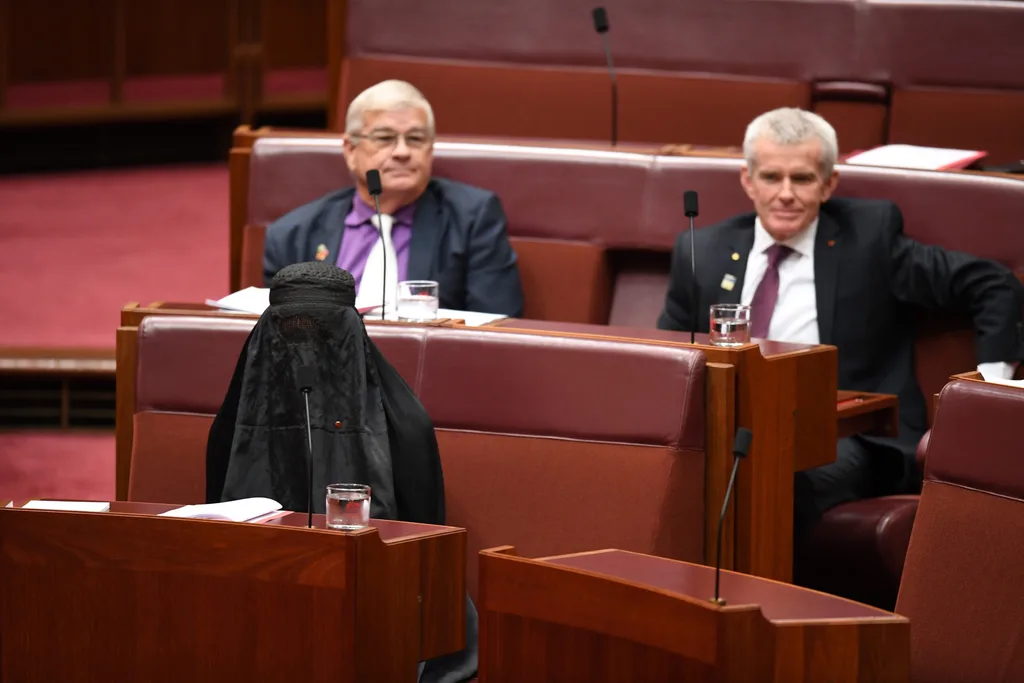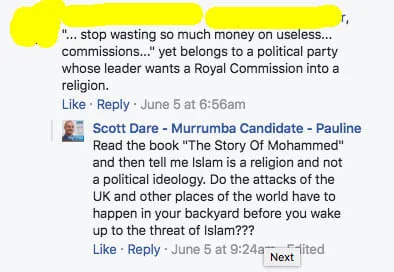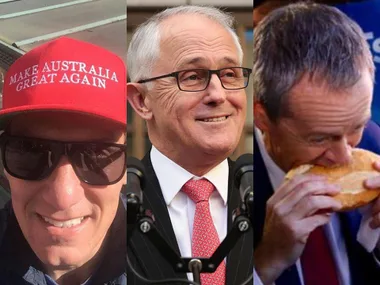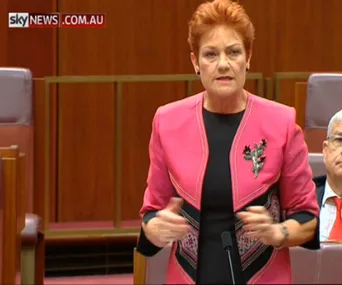This afternoon Pauline Hanson walked into the Senate wearing a full burqa. Other senators audibly sighed “what on earth?” while some jaws hit the floor.
The senator will apparently be delivering a speech calling for the government to ban full face coverings in public, while wearing a full face covering in public? Yeah, it doesn’t make sense to us either.

Is this because black never goes out of style?
The stunt comes just days after the Trump administration had a go at Hanson for her anti-Muslim rhetoric…
When Trump thinks you’re taking the Islamophobia too far you definitely need to take a long, good, hard look at yourself in the mirror.
We wish we could be surprised at these cheap “bits”, designed to get a reaction by further marginalising groups already on the fringe, but hey, welcome to Australian politics.

Earlier this year, British Prime Minister Theresa May suspended one of her conservative MPs who used the N-word while discussing Brexit.
Party Whip Anne Marie Morris left others in shock when she told the event:
“Now I’m sure there will be many people who’ll challenge that, but my response and my request is look at the detail, it isn’t all doom and gloom. Now we get to the real n—-r in the woodpile, which is, in two years what happens if there is no deal?”

Despite her offhand delivery, let’s unpack how truly offensive that phrase is.
It originated in deep-south America in the mid-19th century and described fugitive slaves who hid in piles of firewood as they attempted to escape to Canada. It made its way to Britain in the 20th century as a metaphor for a hidden fact or problem.
It’s not even the first time it’s been used in parliament, with Tory MP Lord Dixon-Smith using the same phrase in 2008.
People immediately called for disciplinary action and May asked the chief whip to suspend the party whip.
“Language like this has absolutely no place in politics or in today’s society,” she said.
So, what about Australia?
What are our hate speech laws?
(1) It is unlawful for a person to do an act, otherwise than in private, if:
(a) the act is reasonably likely, in all the circumstances, to offend, insult, humiliate or intimidate another person or a group of people; and (b) the act is done because of the race, colour or national or ethnic origin of the other person or of some or all of the people in the group.So basically, this means it’s as illegal for you to say something as shockingly horrific as all Muslims are terrorists as it is to not rent your home to someone purely because they’re a different race to you.
Nonetheless, it seems the zero tolerance policy to racism from politicians hasn’t quite reached us.
Earlier this year, Buzzfeed revealed One Nation candidate Scott Dare posted on Facebook a list of things we wanted to achieve for the seat of Murrumba.
In comments that were deleted after Dare was contacted by BuzzFeed, he made his thoughts on the “threat of Islam” pretty damn clear.

Another comment saw someone suggest a spray for “Mozzies and Muzzies !! It would be great to rid Australia of both.”
And the hopeful candidate replied with a laugh and, “I hear you there, Jeff!!”
And nothing happened.
Which is sadly unsurprising when his party leader Pauline Hanson has repeatedly rejected the racist label, despite constantly making remarks about race:
“As I said, the word ‘racist’ means to believe your race to be superior to another,” Hanson said earlier this year. “I have never, ever said that. I challenge anyone to show me anything I have said that has been racist.”
Pauline Hanson, who likened Islam to a “disease” Australia needs to “vaccinate” against, who called for a ban on South African immigration because “they’ve got AIDS” and are “no benefit to this country whatsoever”, who demanded fewer benefits for indigenous people, doesn’t consider herself racist.
One Nation is an obvious target here, but the problem is far more insidious than that.
Late last year, the UN’s Special Rapporteur on racism, Mutuma Ruteere, was concerned about the “divisive and racist rhetoric” used by Australian politicians.
“I note with concern that some populist politicians, cheered on by sections of mainstream media, continue to stereotype and fan hostility against certain categories of migrants,” Mr Ruteere told reporters in Canberra.
Although he chose not to name names, the comments came suspiciously soon after Peter Dutton said Malcolm Fraser should not have let Lebanese Muslims into Australia in the 1970s due to the small number in subsequent generations who were involved in terrorism-related offences.
We can call Australia the immigrant country as much as we want, but until politicians are rebuked when they make racist and divisive comments, how can we expect our country to be any different?
Oh, and if I hear the term reverse racism one more time I’m going to have an aneurysm .
That’s not a thing.



